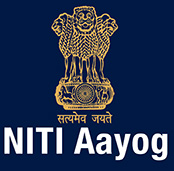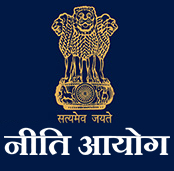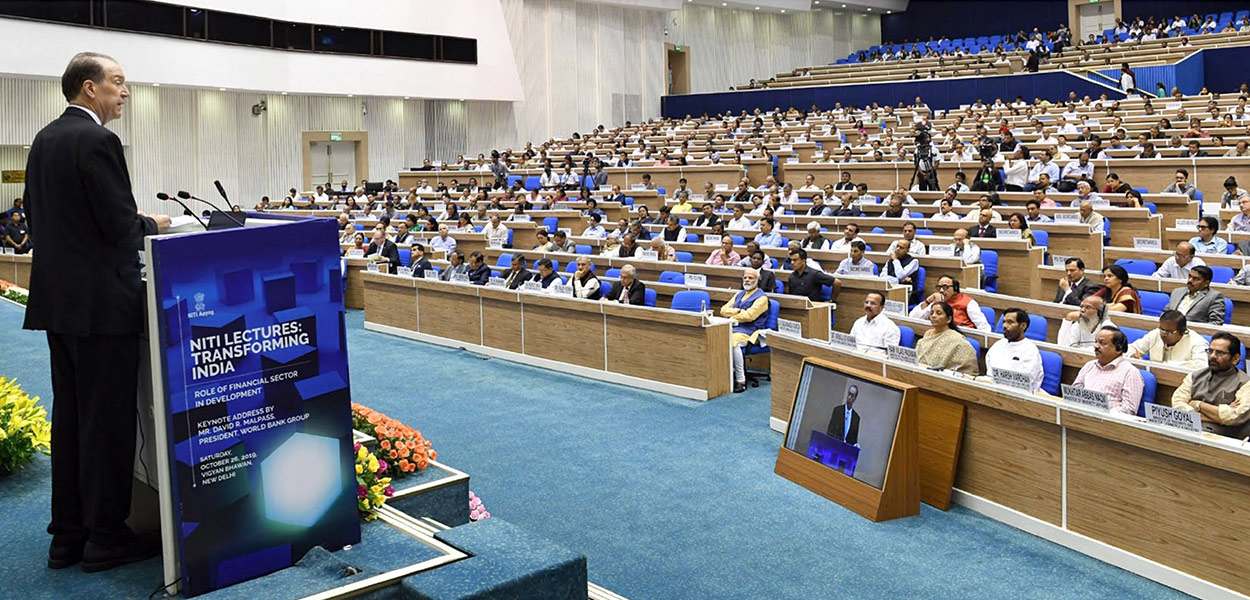- Lecture 1: India and the Global Economy
-
NITI Lectures aim to bring international policymakers, academics, experts and administrators to India to discuss their experience in development and good governance.
The first lecture was inaugurated on 26 August 2016 by Shri Narendra Modi, Hon’ble Prime Minister of India. The keynote address, 'India and the Global Economy', was delivered by Shri Tharman Shanmugaratnam, Hon’ble Deputy Prime Minister of Singapore.
- Lecture 2: Technology And Transformation
-
NITI Aayog aims to build strong States that will come together to build a strong India. As the government’s premier think-tank, we view knowledge building & transfer as the enabler of real transformation in the States.
To build knowledge systems for the States and the Centre, NITI is pleased to announce the launch of “NITI Lectures: Transforming India".
The second lecture in the high-powered NITI Lecture series is being delivered by Bill Gates, Co-Founder, Bill and Melinda Gates Foundation on the November 16th, 2016. The theme of the lecture is 'Technology and Transformation'.
Outlining the global shifts that impact the nation's development, the lecture will discuss India's many advantages, its potential to address existing challenges and the opportunities that lay ahead by using technology and innovation as levers for transformation.
Through this lecture series, NITI Aayog aims to bring policy makers, academics, experts and administrators of global repute to India, for the benefit of policy makers in States and the Centre. This is aimed at learning from global experience in development and good governance.
View the key note address by Mr. Bill Gates here: Download/View
- Lecture 3: Competitiveness Of Nations & States - New Insights

- Lecture 4: AI For All: Leveraging Artificial Intelligence For Inclusive Growth
-
The 'NITI Lectures: Transforming India' was inaugurated by the Prime Minister Shri Narendra Modi on August 26, 2016 and since been held annually, featuring eminent speakers from across the world. The first key note address – ‘India and the Global Economy’ - was delivered by the Deputy Prime Minister of Singapore, Shri Tharman Shanmugaratnam. Bill Gates, Co-Founder, Bill and Melinda Gates Foundation delivered the Second lecture in the high-powered lecture series on 'Technology and Transformation' on the November 16, 2016 and on May 25, 2017, Dr. Michael Porter, the Bishop William Lawrence University Professor at Harvard Business School, delivered the Third Transforming India Lecture, titled ‘Competitiveness of Nations and States: New Insights’.
The Fourth edition of NITI Lecture Series was delivered by Mr Jensen Huang, President and Co-Founder, NVIDIA Corporation on October 22, 2018, on the theme“AI for ALL: Leveraging Artificial Intelligence for Inclusive Growth”.With the vision of disseminating cutting-edge, innovative ideas in development policy to India, the NITI Lectures are attended by the Government’s top decision makers, including members of the Cabinet and senior officials across ministries and departments. Through the lectures, NITI Aayog has been bringing policy makers, academics, experts and administrators of global repute to India. The aim of the series is to enable learning, both at the Centre & States, from successful development practice world over.
- Lecture 5: Role of Financial Sector in Development
-
NITI Aayog organized the fifth edition of NITI Lecture Series at Vigyan Bhawan, New Delhi, on 26 October 2019. Prime Minister Shri Narendra Modi attended the lecture, in which the keynote address was delivered by David R. Malpass, President, World Bank Group. The theme this year was “Role of Financial Sector in Development”. The panelists for this year’s lecture were Uday Kotak, Executive Vice Chairman and Managing Director of Kotak Mahindra Bank; Dr Rajiv Lall, Non-Executive Chairman of IDFC bank; Ajit Ranade, Chief Economist at Aditya Birla Group; and Pranjul Bhandari, Chief Economist at HSBC Securities and Capital Markets. Union Ministers, policymakers, experts from different walks of life, along with NITI Aayog Vice Chairman, Members, CEO and senior officials, were part of the august gathering.
Role of Financial Sector in Development
As one of the fastest-growing economies in the world, a robust financial sector is vital to India’s economic well-being. David Malpass mentioned that the country has made great strides in reducing poverty. The Indian Government has introduced important market-oriented reforms. According to the World Bank’s Doing Business report, which measures ease-of-doing business, India is in the top ten in terms of improvement for the third year in a row. During that period, it jumped from 142nd in the Doing Business rankings to 63rd. Per the new report, it’s easier than it was a year ago to file for a new business, get a construction permit and trade goods across the border.However, to reach the $5-trillion-economy goal, strong and sound reforms in taxes, trade, infrastructure and government structures, along with a strong, stable financial sector, and financial-sector reforms are required.
India has the potential to build the biggest banking sector in the world. Malpass mentioned three key areas in this regard: (1) adding private capital (2) deepening capital markets (3) effective regulation of NBFCs.
He mentioned that credit will have to grow, while maintaining quality. He lauded the Reserve Bank of India on its efforts to monitor asset quality.During the panel discussion, it was felt that a strong government, supervision, efficiency and risk management of banks are the need of the hour. Privatization would boost credit creation and reduce moral hazard. Democratization and greater access to credit is essential.
The right sequencing of events—Aadhaar, the Prime Minister’s push to every household to have a bank account, and a smartphone revolution—enabled India to emerge as a global leader in digital payments.
The change has to be gradual. The ultimate goal should to be to allow innovation and change. That will lead to strong growth.
NITI Lectures
 National Portal Of India
National Portal Of India 


